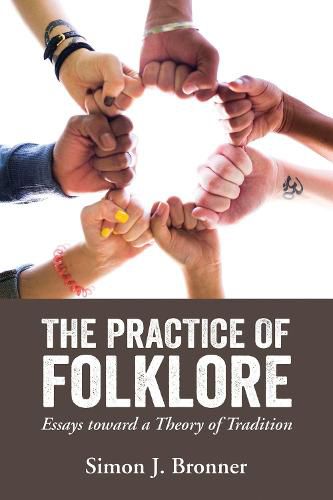Readings Newsletter
Become a Readings Member to make your shopping experience even easier.
Sign in or sign up for free!
You’re not far away from qualifying for FREE standard shipping within Australia
You’ve qualified for FREE standard shipping within Australia
The cart is loading…






This title is printed to order. This book may have been self-published. If so, we cannot guarantee the quality of the content. In the main most books will have gone through the editing process however some may not. We therefore suggest that you be aware of this before ordering this book. If in doubt check either the author or publisher’s details as we are unable to accept any returns unless they are faulty. Please contact us if you have any questions.
Despite predictions that commercial mass culture would displace customs of the past, traditions firmly abound, often characterized as folklore. In The Practice of Folklore: Essays toward a Theory of Tradition, author Simon J. Bronner works with theories of cultural practice to explain the social and psychological need for tradition in everyday life.
Bronner proposes a distinctive praxic perspective that will answer the pressing philosophical as well as psychological question of why people enjoy repeating themselves. The significance of the keyword practice, he asserts, is the embodiment of a tension between repetition and variation in human behavior. Thinking with practice, particularly in a digital world, forces redefinitions of folklore and a reorientation toward interpreting everyday life. More than performance or enactment in social theory, practice connects localized culture with the vernacular idea that this is the way we do things around here. Practice refers to the way those things are analyzed as part of, rather than apart from, theory, thus inviting the study of studying. The way we do things invokes the social basis of doing in practice as cultural and instrumental.
Building on previous studies of tradition in relation to creativity, Bronner presents an overview of practice theory and the ways it might be used in folklore and folklife studies. Demonstrating the application of this theory in folkloristic studies, Bronner offers four provocative case studies of psychocultural meanings that arise from traditional frames of action and address issues of our times: referring to the boogieman; connecting wild child beliefs to school shootings; deciphering the offensive chants of sports fans; and explicating male bravado in bawdy singing. Turning his analysis to the analysts of tradition, Bronner uses practice theory to evaluate the agenda of folklorists in shaping perceptions of tradition-centered folk societies such as the Amish. He further unpacks the culturally based rationale of public folklore programming. He interprets the evolving idea of folk museums in a digital world and assesses how the folklorists’ terms and actions affect how people think about tradition.
$9.00 standard shipping within Australia
FREE standard shipping within Australia for orders over $100.00
Express & International shipping calculated at checkout
This title is printed to order. This book may have been self-published. If so, we cannot guarantee the quality of the content. In the main most books will have gone through the editing process however some may not. We therefore suggest that you be aware of this before ordering this book. If in doubt check either the author or publisher’s details as we are unable to accept any returns unless they are faulty. Please contact us if you have any questions.
Despite predictions that commercial mass culture would displace customs of the past, traditions firmly abound, often characterized as folklore. In The Practice of Folklore: Essays toward a Theory of Tradition, author Simon J. Bronner works with theories of cultural practice to explain the social and psychological need for tradition in everyday life.
Bronner proposes a distinctive praxic perspective that will answer the pressing philosophical as well as psychological question of why people enjoy repeating themselves. The significance of the keyword practice, he asserts, is the embodiment of a tension between repetition and variation in human behavior. Thinking with practice, particularly in a digital world, forces redefinitions of folklore and a reorientation toward interpreting everyday life. More than performance or enactment in social theory, practice connects localized culture with the vernacular idea that this is the way we do things around here. Practice refers to the way those things are analyzed as part of, rather than apart from, theory, thus inviting the study of studying. The way we do things invokes the social basis of doing in practice as cultural and instrumental.
Building on previous studies of tradition in relation to creativity, Bronner presents an overview of practice theory and the ways it might be used in folklore and folklife studies. Demonstrating the application of this theory in folkloristic studies, Bronner offers four provocative case studies of psychocultural meanings that arise from traditional frames of action and address issues of our times: referring to the boogieman; connecting wild child beliefs to school shootings; deciphering the offensive chants of sports fans; and explicating male bravado in bawdy singing. Turning his analysis to the analysts of tradition, Bronner uses practice theory to evaluate the agenda of folklorists in shaping perceptions of tradition-centered folk societies such as the Amish. He further unpacks the culturally based rationale of public folklore programming. He interprets the evolving idea of folk museums in a digital world and assesses how the folklorists’ terms and actions affect how people think about tradition.